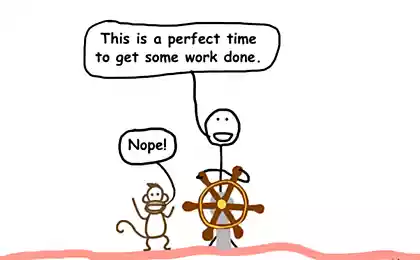575
The bad habits of handling money — how to get rid of them
If you have habits that threaten your financial well-being (from mindless and useless spending to late payment of accounts) – this alarm. Below you will find the tips of specialists who will determine how well you handle money and help you to cope with the shortcomings if they are you have found.
Eighteen million four hundred fifty one thousand eighty five
1. Do you buy takeaway food... as well as coffee and snacks If you live or work in the city (or your daily route passes through five different auto cafe), then buy lunch takeaway seductively easy – and fraught with problems, if your habit starts absorbing the money you'd planned to save for something else... for example, on vacation in the Caribbean.
“There's nothing wrong with buying lunch or a snack on the go, says Director of financial planning company LearnVest Planning Services Stephanie Kirkpatrick. But when you put yourself in more serious financial goals, it is one of the easiest ways to cut costs without seriously compromising quality of life.”
Of course, ideally, it would be necessary not to exclude the purchase of food at the last minute, but it doesn't always work. “If you find it too hard to quickly abandon the wasteful habits, plan your budget and decide in advance how much you are going to spend – and then try to spend a little less than the indicated amount in the next month – recommends Kirkpatrick. Definitely let yourself indulge yourself hotel & restaurant food at least once a week, if she likes you so to not feel that you feel something lacking.
2. You pay for unnecessary services Of course, to pay your bills on time is a good habit, but to pay more than necessary – not the best idea.
Need an example? Astronomical bills for cable TV with 300 odd channels to watch that you don't have the time. Here you are not alone: the average American account, such as for cable TV, including telephone and Internet services, is 128 dollars – three times more than 10 years ago.
“All expenses are divided into three types, explains financial planner in LearnVest Planning Services Natalie Taylor. You can control what you can influence, and that does not give any control or influence. Monthly payments belong to the second group, so use that fact wisely”.
“First, you can find the website of your provider to see what starting and special rates they offer now and there is a possibility of manoeuvre on your tariff.”
3. You do not give priority to the payment of loans with a high interest rate Today, most people somehow must pay at least through various loans – whether student, mortgage or payment by credit card. But when there are free means to repay any of your debts ahead of schedule, the most productive strategy here is prioritization.
You have your debts in order from highest interest rate to lowest, and prioritise debt repayment in the first place, trying to repay the loan with the highest interest rate and investing any surplus funds. Once it's paid, you can go down the list to pay off the next debt with the highest rate.
“Focusing on paying only one debt at a time (while making minimum payments on all other loans), you'll not only save money, but eventually your budget will get additional flexibility – explains Taylor. – As the repayment of each debt you have to worry is becoming one reason less. You can continue to pay the same amount and on, but in any case, there is more freedom of action, which is very nice.”
4. You retain the credit card debt for a long time Although there is nothing wrong to use a credit card, when you can not pay the total amount over time, if not you did not pay the debt on time, then it starts to drip interest that will be added to your debt.
“Pay off debt can be a challenge. If you have multiple cards with the remains of debt, select one where the highest bid and pay her a priority, based on the principle of setting priorities, and making the minimum payments on other cards”. If you have a good credit history, look for cards with lower interest rates, which can temporarily lower the rate when you carry a balance; but don't forget to take into account the additional fees charged for the transfer before accepting a particular proposal.
5. You pay for your vacation to the maximum A trip to the South of France in July is worth a fortune for the simple reason that rest there in the summer everyone wants. But you can cut costs by going back in peak and mid season, or in the months before the peak. The alternative is to go in a similar, but less expensive place.
“Compare the different places which offer you are interested in vacation, for example, a beach vacation,” – says financial planner LearnVest Planning Services Kathy brewer. She also recommends that you define a budget trip in advance and save money each month in order to the right time on your hands was required amount.” Brewer proposes to use these travel sites aggregators like Kayak and Orbitz, to compare the best day, week and month to travel to a certain place.
6. You are doing the most important savings on leftovers Many of us have a bad habit first pay secondary bills and smaller debts, and only the remaining money to save for such needs as an emergency Fund, wedding, down payment for a house or a trip abroad.
It seems we just can't grasp that to save money it is really necessary, otherwise our plans will never be realized.
The solution to this problem lies in the following point: "First pay to yourself". This can be done by setting the function of automatic transfer of a certain amount from your paycheck to your savings account, or automatic transfer from your current checking account. You will not spend money which you do not see, and might be only too happy to rearrange your budget so that these savings continued to grow. “First, you will need to get used to – says brewer – but you will feel much better when you see your bill each month grows with minimal effort “.
7. You're not selling your savings systematically It's great if you put money into retirement and savings accounts – but it would be even better if you automate these contributions. Therefore, the principle of "made business – walk safely" will not work here.
As you grow your goals and hopefully income, your savings should also increase to match these changes. “The gradual increase savings can drastically affect your future, without exerting much impact on your current budget, explains Farnham. Fortunately, this is another habit that can be automated – set a calendar reminder to increase your contributions by at least 1% of their income every six months.
8. You overpay for gifts, buying them at the last moment December comes every year at the same time, so why is he always catches us by surprise and makes shake out of the pockets of the money, to please loved ones?
Instead make a list of the gifts in early December, why not make it a habit to do this at the end of December or early January next year? Thus, you will have 12 months to take advantage of discounts, wait shares and avoid "raskoshelitsya" at the last second.
In addition, advance planning can provide an additional advantage for your budget. “I often advised the clients to make calendar gifts for the whole year – says derrick. – Noting all the birthdays, anniversaries, important dates and holidays, as well as the usual amount you usually spend on each person, you better be aware of upcoming costs. Then divide the resulting amount by 12. In those months when you don't need to buy gifts, you can save for a time when you have to exceed the usual budget.”
9. You forget about the gift card You are the lucky winner of a gift certificate and forgot about it, until he came expire? You are not alone!
“For many gift cards and certificates mean “I don't know what to get you”, but in fact it is real money,” says Kirkpatrick. “Even if it's a map of a shop, where you do not go, you may buy a gift for someone else.”
Thus, instead of postpone your gift cards "for later", put them in a wallet or glove box of your car to have them at hand when needed.
source: mixstuff.ru
Source: /users/1077
Eighteen million four hundred fifty one thousand eighty five
1. Do you buy takeaway food... as well as coffee and snacks If you live or work in the city (or your daily route passes through five different auto cafe), then buy lunch takeaway seductively easy – and fraught with problems, if your habit starts absorbing the money you'd planned to save for something else... for example, on vacation in the Caribbean.
“There's nothing wrong with buying lunch or a snack on the go, says Director of financial planning company LearnVest Planning Services Stephanie Kirkpatrick. But when you put yourself in more serious financial goals, it is one of the easiest ways to cut costs without seriously compromising quality of life.”
Of course, ideally, it would be necessary not to exclude the purchase of food at the last minute, but it doesn't always work. “If you find it too hard to quickly abandon the wasteful habits, plan your budget and decide in advance how much you are going to spend – and then try to spend a little less than the indicated amount in the next month – recommends Kirkpatrick. Definitely let yourself indulge yourself hotel & restaurant food at least once a week, if she likes you so to not feel that you feel something lacking.
2. You pay for unnecessary services Of course, to pay your bills on time is a good habit, but to pay more than necessary – not the best idea.
Need an example? Astronomical bills for cable TV with 300 odd channels to watch that you don't have the time. Here you are not alone: the average American account, such as for cable TV, including telephone and Internet services, is 128 dollars – three times more than 10 years ago.
“All expenses are divided into three types, explains financial planner in LearnVest Planning Services Natalie Taylor. You can control what you can influence, and that does not give any control or influence. Monthly payments belong to the second group, so use that fact wisely”.
“First, you can find the website of your provider to see what starting and special rates they offer now and there is a possibility of manoeuvre on your tariff.”
3. You do not give priority to the payment of loans with a high interest rate Today, most people somehow must pay at least through various loans – whether student, mortgage or payment by credit card. But when there are free means to repay any of your debts ahead of schedule, the most productive strategy here is prioritization.
You have your debts in order from highest interest rate to lowest, and prioritise debt repayment in the first place, trying to repay the loan with the highest interest rate and investing any surplus funds. Once it's paid, you can go down the list to pay off the next debt with the highest rate.
“Focusing on paying only one debt at a time (while making minimum payments on all other loans), you'll not only save money, but eventually your budget will get additional flexibility – explains Taylor. – As the repayment of each debt you have to worry is becoming one reason less. You can continue to pay the same amount and on, but in any case, there is more freedom of action, which is very nice.”
4. You retain the credit card debt for a long time Although there is nothing wrong to use a credit card, when you can not pay the total amount over time, if not you did not pay the debt on time, then it starts to drip interest that will be added to your debt.
“Pay off debt can be a challenge. If you have multiple cards with the remains of debt, select one where the highest bid and pay her a priority, based on the principle of setting priorities, and making the minimum payments on other cards”. If you have a good credit history, look for cards with lower interest rates, which can temporarily lower the rate when you carry a balance; but don't forget to take into account the additional fees charged for the transfer before accepting a particular proposal.
5. You pay for your vacation to the maximum A trip to the South of France in July is worth a fortune for the simple reason that rest there in the summer everyone wants. But you can cut costs by going back in peak and mid season, or in the months before the peak. The alternative is to go in a similar, but less expensive place.
“Compare the different places which offer you are interested in vacation, for example, a beach vacation,” – says financial planner LearnVest Planning Services Kathy brewer. She also recommends that you define a budget trip in advance and save money each month in order to the right time on your hands was required amount.” Brewer proposes to use these travel sites aggregators like Kayak and Orbitz, to compare the best day, week and month to travel to a certain place.
6. You are doing the most important savings on leftovers Many of us have a bad habit first pay secondary bills and smaller debts, and only the remaining money to save for such needs as an emergency Fund, wedding, down payment for a house or a trip abroad.
It seems we just can't grasp that to save money it is really necessary, otherwise our plans will never be realized.
The solution to this problem lies in the following point: "First pay to yourself". This can be done by setting the function of automatic transfer of a certain amount from your paycheck to your savings account, or automatic transfer from your current checking account. You will not spend money which you do not see, and might be only too happy to rearrange your budget so that these savings continued to grow. “First, you will need to get used to – says brewer – but you will feel much better when you see your bill each month grows with minimal effort “.
7. You're not selling your savings systematically It's great if you put money into retirement and savings accounts – but it would be even better if you automate these contributions. Therefore, the principle of "made business – walk safely" will not work here.
As you grow your goals and hopefully income, your savings should also increase to match these changes. “The gradual increase savings can drastically affect your future, without exerting much impact on your current budget, explains Farnham. Fortunately, this is another habit that can be automated – set a calendar reminder to increase your contributions by at least 1% of their income every six months.
8. You overpay for gifts, buying them at the last moment December comes every year at the same time, so why is he always catches us by surprise and makes shake out of the pockets of the money, to please loved ones?
Instead make a list of the gifts in early December, why not make it a habit to do this at the end of December or early January next year? Thus, you will have 12 months to take advantage of discounts, wait shares and avoid "raskoshelitsya" at the last second.
In addition, advance planning can provide an additional advantage for your budget. “I often advised the clients to make calendar gifts for the whole year – says derrick. – Noting all the birthdays, anniversaries, important dates and holidays, as well as the usual amount you usually spend on each person, you better be aware of upcoming costs. Then divide the resulting amount by 12. In those months when you don't need to buy gifts, you can save for a time when you have to exceed the usual budget.”
9. You forget about the gift card You are the lucky winner of a gift certificate and forgot about it, until he came expire? You are not alone!
“For many gift cards and certificates mean “I don't know what to get you”, but in fact it is real money,” says Kirkpatrick. “Even if it's a map of a shop, where you do not go, you may buy a gift for someone else.”
Thus, instead of postpone your gift cards "for later", put them in a wallet or glove box of your car to have them at hand when needed.
source: mixstuff.ru
Source: /users/1077























